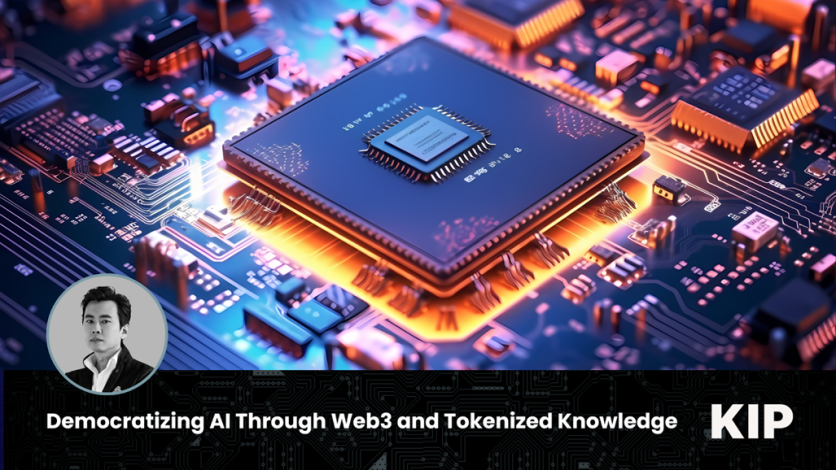
While the world is going through an AI revolution, the wave is undeniably dominated by a handful of powerful corporations. Centralized players in Big Tech control everything from the data to the algorithms.
The centralization of data and knowledge creates a profound imbalance and bottlenecks in innovation. Knowledge becomes a property, and AI's vast potential is filtered through profit-first models that often sideline transparency and open collaboration.
However, blockchain technology has introduced a new paradigm rooted in decentralization and shared value. It combines the composability of Web3 with the generative power of AI to create a new ecosystem where knowledge can be tokenized and intelligent agents can operate freely across networks without gatekeepers.
Julian Peh is at the forefront of this movement. As a co-founder of KIP Protocol, he wants to democratize AI so that intelligence is a public good and not a proprietary asset.
Who Is Julian Peh?
Julian Peh is a seasoned tech entrepreneur and investor with a track record that spans across Web1, Web2, and now Web3. He began building internet businesses in 1998, launching ventures in ad tech, digital media, O2O tracking, and big data analytics. A prominent accomplishment was his founding and building of the largest adtech and media group in Asia serving premium and luxury advertisers. The group was first invested in by and subsequently sold in 2014 to one of the largest media conglomerates in Asia, SPH.
He has been actively investing in and advising on investments in cutting-edge tech, including Web3, robotics, and artificial intelligence. His involvement in AI began in 2019, starting with his investment in Eigenform, one of the earliest AI companies, which was a notable consultant in machine learning and natural language processing serving governments and large organisations.
With his partner at Eigenform, Julian then launched KIP Protocol, a next-gen decentralization infrastructure, officially expanding the AI business from services into products and product infrastructure. KIP raised $5M in funding from Animoca Ventures and Tribe Capital.
Peh's work is driven by the goal of building infrastructure that makes knowledge more accessible and innovation more collaborative. His vision for the KIP Protocol reflects this by offering an open framework designed to give people more control over their contributions and value in the digital space.
The Role of KIP Protocol
KIP Protocol is a purpose-built decentralized infrastructure that helps make deployment of decentralised AI much easier for all.
Central to the platform is Decentralized RAG (retrieved-augmented generation), a technology invented by KIP researchers, which empowers tokenised (ie, decentralised) AI components like models, applications, and knowledge bases to connect seamlessly over a blockchain infrastructure. It empowers AI agents to access and reason over tokenized knowledge stored on-chain, unlocking a permissionless and composable framework for intelligent agents.
KIP treats knowledge as a tokenized digital asset, essentially introducing a concept contrary to the traditional centralized approach. It allows knowledge artifacts like datasets, models, prompts, and documents to be owned, traded, and minted. The protocol, in turn, creates new economic opportunities for creators and developers in the AI space.
The business model of KIP Protocol falls into several categories, namely B2B, B2G, and B2C.
Why Tokenized Knowledge Matters
Tokenized knowledge is the idea that intellectual contributions, such as data and insights, can be represented as digital assets. Once tokenized, the assets can be owned, licensed, and monetized like any other valuable resource.
For example, a researcher can tokenize their whitepaper or training dataset, while a developer may publish a fine-tuned model to KIP Hub, allowing others to build on top of it and earn usage-based rewards or licensing fees without an intermediary.
Instead of platforms getting developers and researchers' work to monetize, these individuals retain the royalties and get the recognition. In short, tokenized knowledge makes information tradable.
The Web3 Advantage
Web3 brings the missing layer to AI by introducing ownership and decentralization. KIP makes knowledge assets accessible to all, so they are no longer hidden behind corporate walls.
Staking and governance further facilitate community involvement and let users shape how AI agents grow. The best part is that these benefits aren't just theoretical.
In decentralized finance, tokenized models have made trading bots smarter, whereas in healthcare, on-chain data has improved AI diagnostics. Going forward, new applications will emerge in other fields, such as agriculture and transportation.
Julian Peh's Vision for the Future
Julian Peh envisions a world where anyone can deploy, train, and monetize AI freely. Powered by decentralized agents that learn and self-evolve autonomously, his version of the future reclaims intelligence from gatekeepers and builds an open, community-driven AI economy that belongs to the people, not corporations.
Closing Thoughts
The future of AI doesn't have to be controlled by a few. KIP Protocol shifts this approach by creating a decentralized space that's built for the people. Explore the ecosystem, connect with like-minded people, and help shape the next generation of intelligence.
Visit KIP Protocol. You can also follow KIP on X and join the Discord community.
![Apple Watch Series 10 [GPS 42mm]](https://d.techtimes.com/en/full/453899/apple-watch-series-10-gps-42mm.jpg?w=184&h=103&f=9fb3c2ea2db928c663d1d2eadbcb3e52)



